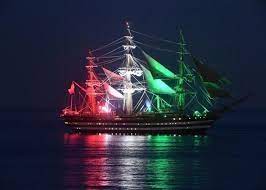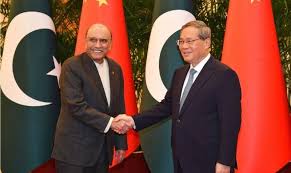Tall ship to embark on ‘Made in Italy’ world tour to promote national identity

Rome: A tall ship named after the Italian explorer Amerigo Vespucci will embark on a two-year voyage as Italy’s conservative government puts the promotion of the country’s food and wine at the heart of its nationalistic expression of Italian identity.
The navy vessel, built in 1930 and described as “the most beautiful ship in the world”, will set sail on 1 July “to bring Made in Italy and the excellence of our country to the world”, according to the defence minister, Guido Crosetto.
“The armed forces are in the field to protect Italian cultural and economic heritage,” Crosetto added.
He made the announcement at a trade fair for Italian wine in Verona last week, an event attended by the prime minister, Giorgia Meloni, and other senior ministers, who posed for selfies while sipping a beverage described by Meloni as not just an economic phenomenon but “a fundamental part of our identity”.
Almost six months after coming to power, the more nationalistic traits of her government are starting to come to the fore.

Days before the wine fair, where Meloni mooted the idea for a “Made in Italy” school, the government approved a draft law that would ban food grown in laboratories, including artificial meat. Despite several studies highlighting the significant environmental benefits that cell-based foods could bring, Francesco Lollobrigida, the minister for agriculture and food sovereignty, said: “Laboratory products, in our opinion, do not guarantee quality, wellbeing and the protection of our culture, our tradition.”
Food, which has long been used by Italy’s rightwing parties as a symbol of cultural identity, is not the only thing the government perceives to be under threat. Unhappy with English terms such as “smart-working”, “manager” or “babysitting” contaminating the Italian language, Fabio Rampelli, a deputy with Meloni’s Brothers of Italy, a party with neofascist roots, has proposed a law banning the use of English terms in official communications, with culprits fined up to €100,000 (£88,000). The proposal has echoes of Italy’s fascist past, with some critics comparing it with Benito Mussolini’s “linguistic reclamation” project that aimed to preserve Italian.
It remains to be seen whether Rampelli’s plan will come to fruition, but the chatter around it, as well as the focus on Made in Italy, has been a distraction from the bigger issues.
“Identity construction is typical of the right, although it’s not only an Italian thing,” said Emiliana De Blasio, a professor of sociology at Luiss University in Rome. “However, I just see a lot of communication and little substance. For example, Meloni’s idea for a Made in Italy school isn’t so bad, but what about improving schools and giving dignity to teachers – who are among the lowest paid in Europe – first?”
De Blasio believes the focus on “brand Italy” is a sign of the government’s ideological position rather than an attempt to stall progress.
Sofia Ventura, a politics professor at the University of Bologna, said: “Promoting Italy around the world is a sacred thing and has value … but there are people surrounding Meloni who have this obsession with Italianness, which comes from a world where there is a strong sense of rivalry. The Rampelli proposal is ridiculous … however, part of it is also about not wanting to upset the sensibility of a certain faction of the party or electorate, and so they play this ambiguous game.”





